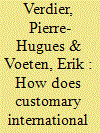| Srl | Item |
| 1 |
ID:
139524


|
|
|
|
|
| Summary/Abstract |
Customary international law (CIL) is a fundamental source of international law. But scholars lack a clear understanding of customary international law, as well as systematic statistical analyses of its workings. Existing theories posit that CIL is a cooperative equilibrium that can be sustained through reciprocity. Yet, CIL lacks institutional features that facilitate reciprocity and is commonly understood to apply universally, even to states that defect or reject a norm. Because the continued existence of CIL depends on state practice, the potential precedential effect of defection encourages cooperation as long as states value the cooperative norm. Consequentially, a state's decision to apply a CIL norm should be a function of the extent to which the norm is practiced in the community of states it interacts with rather than the past behavior of the specific state in an interaction. We test the implications with newly-collected data documenting if and when 121 states switched from absolute to restrictive foreign state immunity. We find no evidence of direct reciprocity. States that most valued absolute immunity and whose defection would most affect others were least likely to defect, but states became more likely to defect as the states whose practice most affected them defected.
|
|
|
|
|
|
|
|
|
|
|
|
|
|
|
|
| 2 |
ID:
176051


|
|
|
|
|
| Summary/Abstract |
In 2018, the American Law Institute published the Restatement (Fourth) of Foreign Relations Law, which restates the law of the United States governing jurisdiction, state immunity, and judgments. These issues arise with great frequency in international cases brought in US courts, including cases involving Chinese parties. This article provides an overview of many of the key provisions of the Restatement (Fourth). The article describes the Restatement (Fourth)’s treatment of the customary international law of jurisdiction, as well the rules of US domestic law based on international comity that US courts apply when deciding international cases.
|
|
|
|
|
|
|
|
|
|
|
|
|
|
|
|
| 3 |
ID:
186078


|
|
|
|
|
| Summary/Abstract |
The legal immunity of the UN has focused the peacekeeping literature on individual accountability and the political willingness of States to prosecute their own. UN immunity applies to peacekeeping operations only when the UN is in effective control. When a State is exerting effective control over its contingent, either solely or jointly, the actions of peacekeepers will be attributed to that State. When States are in effective control, they cannot rely on UN immunity for breaches of their obligations. Once a State is exercising effective control, it must warrant that sufficient mechanisms are undertaken to fulfil its obligations under the law, specifically the extra-territorial nature of international human rights law. The Mothers of Srebrenica case highlights that peacekeeping accountability is not limited to the prosecution of individual peacekeepers. Although UN immunity limits specific avenues of legal recourse, it does not prevent victims from seeking accountability from Troop Contributing Countries.
|
|
|
|
|
|
|
|
|
|
|
|
|
|
|
|